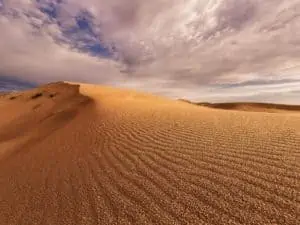Share the post "Hair Woes: The Unseen Consequences of Texas Water"
Water is an essential part of our lives, general well-being, and beauty routines, and we want to know that we are always looking our best, especially our hair. Sometimes you can try every haircare product on the market but still suffer too much hair damage, and that’s when you realize how much of an impact water can have on your hair.
So, is the water in Texas bad for hair?
Texas water can contain high levels of pH and calcification, which could lead to damaged and dry hair that breaks easily or dull hair that looks like all the life is sucked out of it. This is because of high quantities of dissolved minerals that are safe to drink but bad for your skin and hair.

How Texas Water Can Be Bad For Your Hair
The ground in Texas is rich in minerals, which filter through the water supply. The exact quantities vary between regions, but most of the water in Texas contains high levels of calcium and magnesium, making it excellent for sustaining life but not your hair.
Hard water is good for your health. Your body needs the minerals found in Texas’ water supply. However, these minerals affect some hair and skin types badly, as explained in this video. You can easily see if your water contains these minerals, which might explain problems you’re having with your hair:
- The minerals in the water will cause a limescale build-up in the plumbing, ultimately leading to low-pressure water flow.
- Appliances in your house that use water will have a build-up of these minerals. You can usually see it in a kettle or a steam iron.
- Faucets, bathtubs, and shower heads will all have signs of these mineral build-ups, often showing up as colored lines where the water flows.
- If you notice that your dishes aren’t shining like they’re freshly polished, this is probably also due to dissolved calcium in the water. Calcium reacts differently with soap and leaves some soap scum behind.
Note that these signs aren’t always conclusive proof that your water is the problem. Only after trying several haircare products formulated specifically for your hair type, with no visible improvement, can you confidently say that the hard Texas water damages your hair.

How To Know If Texas Water Is The Cause Of Your Bad Hair Day
After you have eliminated all relevant products on the market and still see signs of hair damage, you can start blaming Texas water as the probable culprit.
It’s easy to see if hard water is damaging your hair or skin:
- Hard water may leave your hands feeling slimy even after you’ve washed them with soap.
- Your hair will become more fragile, breaking when combing it out after a bath or shower.
- Prolonged exposure to hard water on your scalp will lead to a build-up of calcium minerals, which prevents healthy nutrition from entering the hair follicles. This interferes with your hair’s natural, healthy growth process.
- Your hair will get heavier and more difficult to style due to the hardness of water found in Texas because of the calcium and magnesium that binds with your hair.
- The chloride and salt content in Texas water ultimately dries out your hair, causing it to break and become brittle. It also causes split ends, dandruff, and the thinning out of hair.
- Exposure to the salt and chloride minerals could lead to discoloration of your hair, more frizzy hair, and tangles if not cared for correctly.

How To Protect Your Hair Against The Effects Of Texas Water
Thankfully, you can take a few steps to save your hair despite using the hard Texas water by getting the right haircare products and using cooler water to wash your hair.
The calcium and other minerals in the water of Texas react to the shampoo, lowering the shampoo’s potency and effectiveness. To protect your hair, you need to use more shampoo to counteract the effect of the minerals in the water.
Another essential fact to know about the dissolved minerals in hard water is that it reacts more aggressively as the water gets warmer. The minerals in cold water won’t bond with your hair as quickly as those in hot water. So, washing your hair in cold water is better than hot water, specifically if you use hard water.
It also helps to apply conditioner to your hair while it’s still dry before you get into the shower. The conditioner will add a layer of protection to your hair, keeping the minerals from bonding with it.
If you regularly color your hair and notice it is fading faster than it should, this could also be due to the dissolved minerals in the water. You should ignore the urge to wash your hair too frequently if you color it; only wash it when it gets oily and dirty.
Using the right shampoo and conditioner will also go a long way toward protecting your hair from the harshness of the minerals in Texas water.
Opt for a paraben and sulfate-free shampoo and conditioner rated for hard water use. These products can adequately withstand the reaction of the minerals.

Water That’s Bad For Hair FAQs
Will A Shower Head Water Filter Help To Protect My Hair?
Purchasing a shower head water filter will eliminate the build-up of minerals in your shower head, which will be softer on your hair. But remember that the minerals are more dissolved in hot water than if the water is cold, so much of it can still pass through the filter.
How Do The pH Levels In Hard Water Affect Hair?
The pH scale has values indicated from 0 to 14, and a pH level of 7 is neutral. Hard water has a pH level of more than 8.5, while normal hair has a pH between 4 and 5.5. Prolonged exposure to higher pH levels in hard water increases the pH levels in your hair, resulting in swollen hair cuticles and damaged hair.
What Does Calcification Mean?
Calcification on your scalp occurs due to the excess calcium found in hard water. Calcium is good for strengthening your bones; however, it clogs up the hair follicles, restricting blood flow to the scalp, causing inflammation, and hindering hair growth.
References:
- How to use hard water shampoo: webmd.com
- Hard water regions and details from the US government: usgs.gov
- What hard water will do to hair: pantene.in
Share the post "Hair Woes: The Unseen Consequences of Texas Water"
Christian Linden is a seasoned writer and contributor at Texas View, specializing in topics that resonate with the Texan community. With over a decade of experience in journalism, Christian brings a wealth of knowledge in local politics, culture, and lifestyle. He holds a Bachelor's degree in Communications from the University of Texas. When he's not writing, Christian enjoys spending weekends traveling across Texas with his family, exploring everything from bustling cities to serene landscapes.











